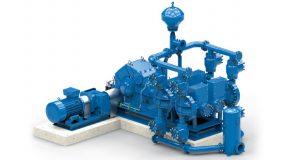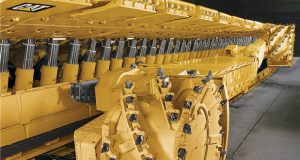At their annual conference on 28th September 2017, the Vereinigung Rohstoffe und Bergbau e. V. (VRB), Berlin/Germany, called for politicians to make a firm commitment to domestic raw material extraction. An industrialised society cannot survive without a reliable supply of various raw materials. This is especially pertinent when the economy is strongly oriented towards exports, as is the case with Germany. “Raw materials – including mining – are the first link in every industrial supply chain. This is still the case when we consider “Industry 4.0”. Even as future industrial processes become interwoven with modern information and communications technology, there will still be strong demand for the raw materials required,” said Lars Kulik, Chair of the VRB Executive Board.
To date, the federal government has rightly followed the strategy of using all three pillars of raw materials policy: Domestic mining, raw materials imports from the global markets and raw materials efficiency/recycling. However, far more research is required before we can achieve a closed circular economy. Across numerous industrial processes, only a certain proportion of secondary raw materials can be deployed without compromising the quality of the products. In addition, Germany primarily buys metallic raw materials on the world markets. The Cologne Institute for Economic Research (IW) has found that the proportion of raw material imports from countries with high political risk has now risen to 62 %; this figure was just 45 % in 1995. It would therefore make sense to draw on the third pillar of raw materials policy: Germany has significant raw material resources when it comes to coal, lignite, potash and rock salt, gravel, sands and industrial minerals, as well as high-tech systems for raw material extraction. “Nearly 75 % of the required natural resources are obtained from domestic deposits. Annually, they contribute around 20 bn € to value added,” explained Kulik at the association’s annual conference.
The positive contribution made by domestic mining to reliability of supply should be explicitly acknowledged in future raw materials and energy policy, regardless of which parties come together to form a coalition. Kulik went into particular detail regarding the use of lignite as a domestic energy source and its role in the energy mix: “Because of its availability, competitiveness and major importance to the regional economy, as well as the increasing flexibility of lignite power stations in the electricity market, lignite has strong prospects for the coming years and decades.” The reliability of the electricity supply can only be assured if conventional energy sources are present – at least until methods are developed that can store energy generated by renewable sources, technologically and economically, so that residents and industry can be supplied for weeks on end. Germany can still meet its long-term climate targets despite the coal utilisation required. Coal-fired energy generation will follow a path that is compatible with climate protection goals and the energy transition over the coming decades. “Future energy policy should consider the fact that long-term climate targets are still achievable with lignite,” said Kulik. He reminded those present that the centre-left/green state government in North Rhine-Westphalia ascertained that lignite is an essential component of energy policy in their landmark decision of 2016 on the long-term continuation of open-cast mining operations in the Rhineland, and that the new state government has reiterated this.
At the VRB’s annual conference, VRB Managing Director Thorsten Diercks called for a firm political commitment on the part of federal and regional governments: “The Federal Government’s raw materials strategy is an important starting point for future raw materials policy. There are also several federal state programmes that outline the necessary objectives and measures in the raw materials sector in a comprehensive and accurate manner. The importance of reinforcing the framework conditions for domestic mining, and therefore its contribution to sustainable raw material extraction throughout Germany, remains high. This is because German environmental protection and occupational safety standards in mining can only be adopted at the international level when they are tested in practice and implemented at the national level. These standards are also partially described in the first German report for the Extractive Industries Transparency Initiative (EITI), which the VRB collaborated on and which has just been published.” (VRB/Si.)


